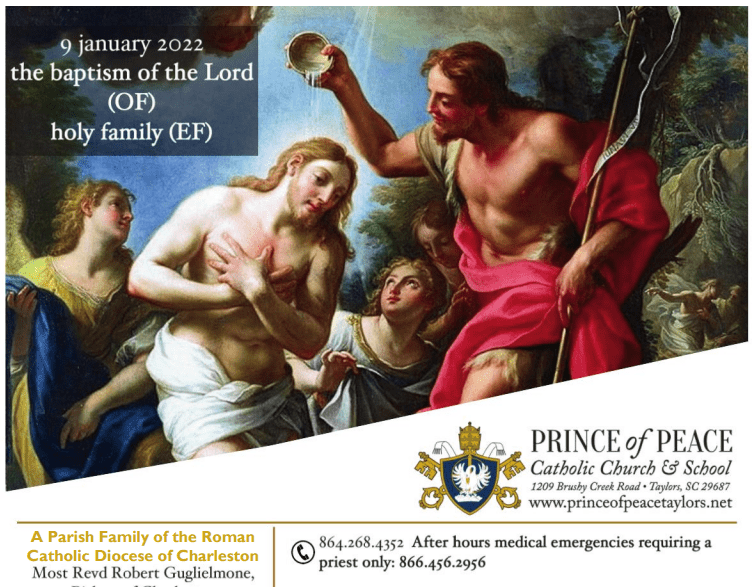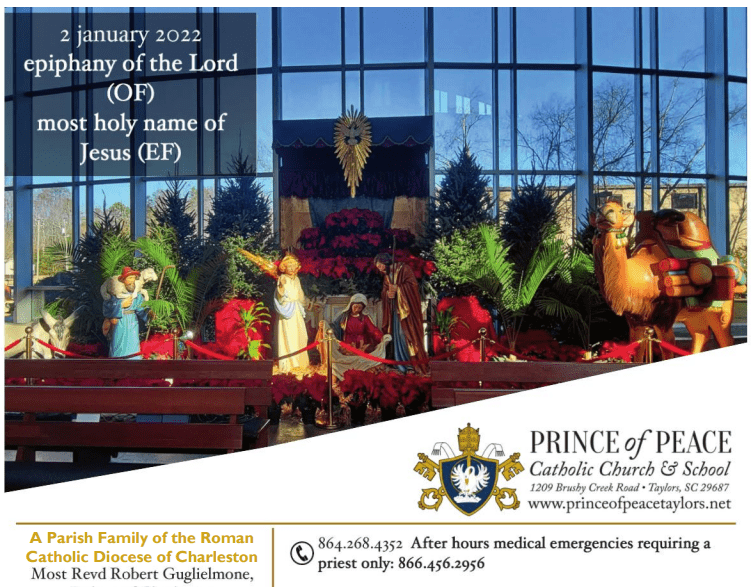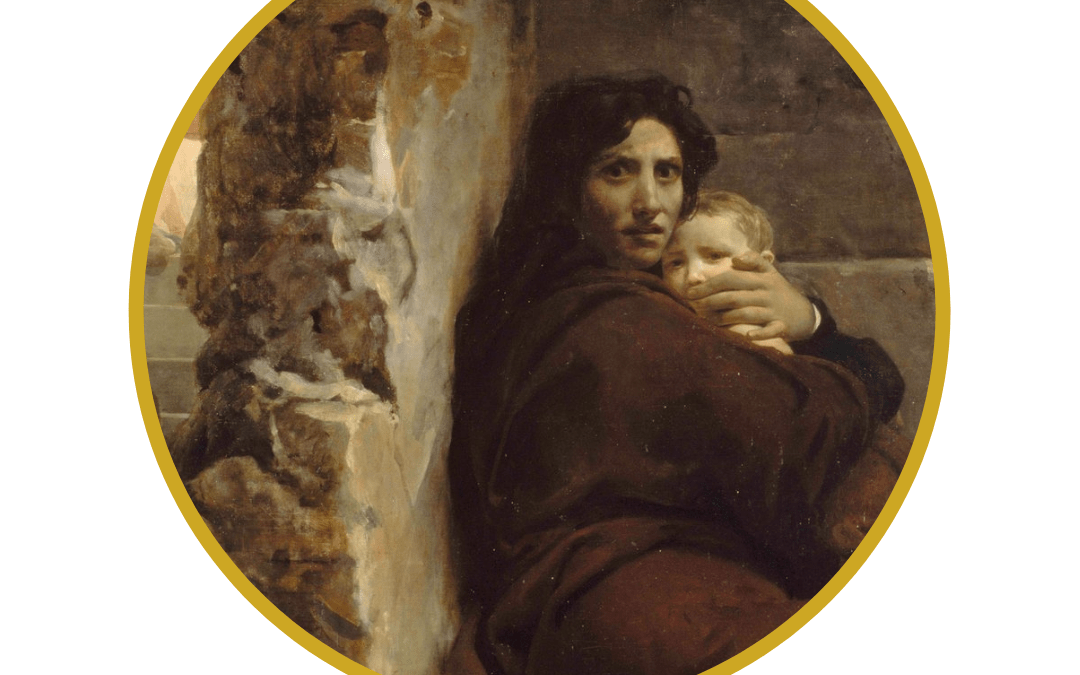
9 January 2022 Bulletin
Click to read this week’s bulletin: 9 January 2022

Click to read this week’s bulletin: 9 January 2022
The Solemnity of Mary, Mother of God is a holy day of obligation. Our Mass schedule is:
*EF = Extraordinary Form
Did you know that the Feast of the Epiphany on 6 January, known in the English speaking world as the Twelfth Night of Christmas, is actually far older than Christmas itself, and for centuries was celebrated with eight days, an Octave, of feasting afterwards? The Epiphany comes from a Greek word meaning manifestation and actually commemorates three manifestations of the Divinity of Christ: when the Wise Men give gifts fit for a king and a deity to the Christ Child, when Jesus was baptized by John in the Jordan and the Father from heaven confirms His divine sonship; and the first miracle of Jesus at the Wedding at Cana. There are numerous customs of Catholic culture associated with Epiphany, and this year at Prince of Peace, we are going to celebrate as many as we can both in our parish church and in your domestic church.
2 January – Sunday: the Transferred Solemnity of the Epiphany in the Ordinary Form
8a Low Mass in English
10a The Proclamation of the Movable Feasts of the Year of Our Lord 2022 and Solemn Mass of the Epiphany in English
2 January – Sunday: the Feast of the Holy Name in the Extraordinary Form
12N Low Mass in Latin
5 January – Wednesday: the Vigil of the Epiphany
12N Low Mass EF in Latin
6 January – Thursday: the Traditional Feast of the Epiphany in the Extraordinary Form
6.30p Solemn Blessing of Epiphany Water, Chalk, Gold – Frankincense – Myrrh
7p Solemn High Mass of the Epiphany
8p Royal Procession to the Epiphany Crib and Benediction of the Most Blessed Sacrament
8 January – Saturday
6p Blessing of the Great Nativity and Prosecco Toast for Donors
6p Epiphany Party & Potluck Dinner for Our Parish Family
On the Feast of the Epiphany in the Domestic Church you are invited to do the following:
On the Traditional Feast of the Epiphany, 6 January, we encourage you to come to the evening liturgy and bring with you the following to be blessed by placing them on the table provided in the sanctuary within the Communion rail:
In Catholic cultures, it was common for the parish priest and the altar servers to go to door in the parish boundaries with blessed Epiphany Water during the Octave of the Epiphany and bless every house in the parish. Because of the size of our territory and the number of parishioners who live outside the territory, that is impossible at Prince of Peace, but you may bring home the water you have blessed at church, mix the salt into it, and sprinkle the inside and outside of your homes and workplaces.
The Eastern Catholic Traditions
To learn more about these amazing Epiphany customs, please read the following:

Click to read this week’s bulletin: 2 January 2022
*note the Wednesday Mass is at 8.30a, not 9a

26 December: Feast of the Holy Family. Little is known about the life of Jesus’s earthly family. The gospels tell of the early years: the birth of Jesus in Bethlehem, the flight into Egypt, the finding of Jesus in the temple. Pope Leo XIII promoted this feast day as a way to counter the breakdown of the family unit. The purpose was to present the Holy Family as the model for all Christian families, and for domestic life in general. Family life becomes sanctified when we live the life of the Church within our homes. This is called the “domestic church” or the “church in miniature.” St. John Chrysostom urged Christians to make each home a “family church,” thus sanctifying the family unit. A good way to do this is by making Christ the center of family life: read scripture regularly, pray together as a family, attend Mass, go to confession, teach children about virtues, learn about and imitate the lives of the saints, live liturgically (follow the church calendar at home), and so forth. It is important to note that we don’t become holy despite the busyness of family life, but in and through it. On this feast, may the virtuous example of the Holy Family of Nazareth inspire us to develop homes full of prayer, love, and holiness.
28 December: Feast of the Holy Innocents (‘Childermas’). On the fourth day in the octave of Christmas, the Church remembers the massacre of innocent children in Bethlehem as told in Matthew 2:16-18. King Herod had ordered the death of all male children aged two and under, in his attempt to kill the infant Jesus. “A voice is heard in Ramah, weeping and great mourning, Rachel weeping for her children and refusing to be comforted, because they are no more.” These children are considered martyrs, Saints of God, by the Church. This feast day is often seen as a day of merrymaking for children. It is custom to give the youngest child in the household the power to rule the day. From what to eat, where to go and what to do, the youngest is in charge. In Mexico, it is a day for children to play practical jokes and pranks on their elders. The Holy Innocents are special patrons of babies and small children. This feast is an excellent time for parents to inaugurate the custom of blessing children. Sign a cross on your child’s forehead with the right thumb and say: “May God bless you and may He be the Guardian of your heart and mind, in the name of the Father, and of the Son, and of the Holy Spirit. Amen.”
Ideas for celebrating at home:
“The first witnesses of Christ’s birth, the shepherds, found themselves not only before the Infant Jesus but also a small family: mother, father and newborn son. God had chosen to reveal himself by being born into a human family and the human family thus became an icon of God! …Indeed, the family is the best school at which to learn to live out those values which give dignity to the person and greatness to peoples. …The Holy Family of Nazareth is truly the “prototype” of every Christian family which, united in the Sacrament of Marriage and nourished by the Word and the Eucharist, is called to carry out the wonderful vocation and mission of being the living cell not only of society but also of the Church, a sign and instrument of unity for the entire human race. …May [the holy family] help Christian families to be, in every part of the world, living images of God’s love.” – Pope Benedict XVI
Recent Comments